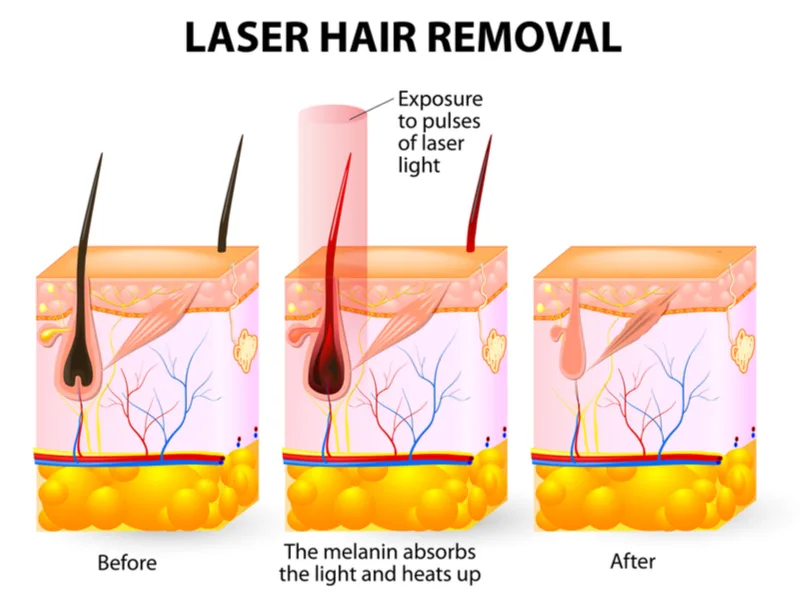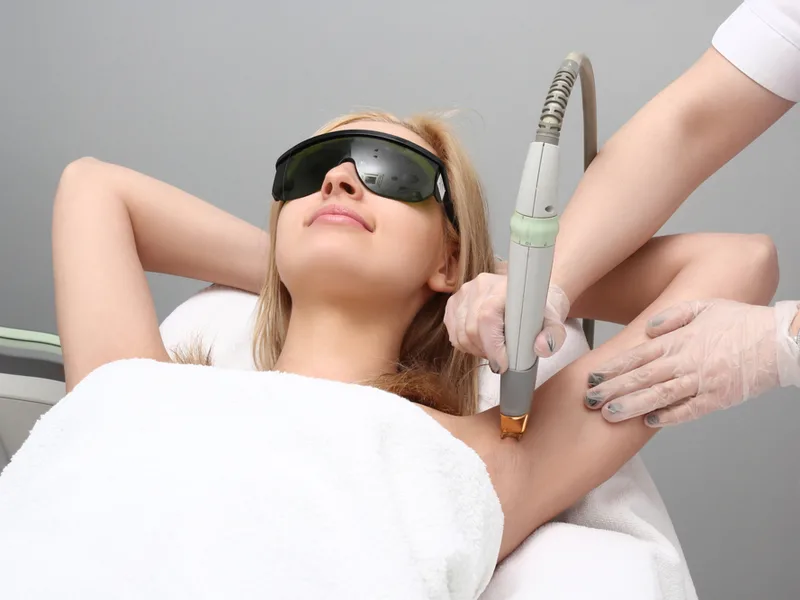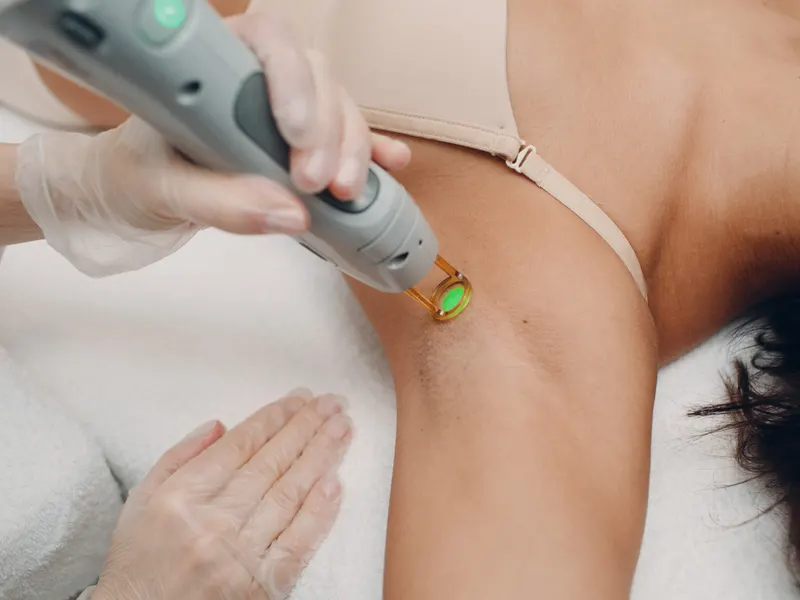Jump to:
Keeping up with ever-growing body hair is time-consuming, so it’s likely got you wondering—should I get laser hair removal? Laser hair removal is an excellent option for certain skin and hair types, and we’ll help you determine if it’s a good fit for you.
Should You Get Laser Hair Removal?
Laser hair removal is the process of semi-permanently stopping hair growth by using a laser to target hair follicles. The laser deteriorates hair down to its root, allowing you to rock a hair-free look for anywhere from a few months to many years.
In this article, you’ll discover if laser hair removal is right for you as we cover the following topics:
- How laser hair removal works
- Best suited skin and hair types
- What to expect from the process
Laser hair removal is expensive. So, knowing the side effects and the chances of your hair body responding well to the treatment is crucial to avoid wasting your money.
Read Next: At-Home Laser Hair Removal Guide
How Laser Hair Removal Works

Designua/Shutterstock
Laser hair removal is the process of directing concentrated light beams into the hair follicles to break down the hair. The follicle pigments absorb the laser light, which causes your hair to dislodge from the root.
The results are semi-permanent, given that the laser damages the root of the hair to prevent future growth. You can use laser beams to remove hair from many parts of your body, including:
- Face
- Legs
- Chin
- Back
- Arms
- Bikini line
The list above is the most common area where people use laser hair treatments. However, they’re safe to use on nearly every body part.
Benefits
There’s a reason that laser hair removal is such a popular hair control choice. Below are some of the biggest benefits you’ll receive by opting for this treatment:
- Fast treatment, given that the laser can treat a quarter-sized area every second
- Within 3 – 7 sessions, you’ll have long-lasting hair loss
- Target hairs without impacting the surrounding skin
- Ideal for fair skin with dark hair
If you’re treating a small section of your body with laser hair removal, each session may last only a few minutes. In contrast, treating your legs can take as long as an hour, depending on your height.
Nevertheless, the time you’ll save by reducing your need to shave make these relatively longer sessions worth it.
Depending on the treatment and your genetic makeup, you can expect your laser treatment to last anywhere from months to years. Furthermore, it’s often easier to manage the hair once it returns since it doesn’t grow in as thick.
Downsides
Despite the many benefits of laser hair removal, it’s not for everyone. So, below are some downsides to this treatment.
- It feels like a rubber band slapping against your skin
- You have to go back for repeated sessions
- Not as effective on darker skin or lighter hair
- Expensive
Sadly, laser hair removal isn’t for people on a budget, as each session can cost hundreds of dollars, depending on where you’re getting it done and the amount of surface area the laser will be covering.
Should you decide that laser hair removal is a good fit for you, do your due diligence to find someone experienced and with proper licenses.
After all, you don’t want to fall victim to the horror stories of people experiencing burns and scars. Furthermore, every state has different licensing requirements and ways to report adverse events.
Side Effects
Even if an experienced laser hair removal specialist treats you, there’s still a chance that you’ll experience some side effects.
The most common side effects of this treatment include:
- Swelling
- Redness
- Mild pain
However, in rarer circumstances, you could end up experiencing:
- Infections
- Herpes simplex (cold sores)
- Blistering
- Lighter or darker skin
Recovery
You can go about living your normal life after getting laser hair removal. However, you’ll likely feel discomfort for the first day or two as the skin heals.
You can expect your skin to feel like it got sunburn, and it’ll have a red appearance. We recommend using cool compresses and moisturizers to soothe your treated skin. Applying sunscreen to any exposed area that had laser hair removal is crucial.
Freshly lasered areas often burn faster than regular skin, so you don’t want to create what could ultimately become a two-tone tan.
Determining If Laser Hair Removal Is Right for You

Kovalchynskyy Mykola/Shutterstock
Laser treatment doesn’t work the same way for everyone, and its success depends on various factors, including:
- Color of your hair
- Color of your skin
- Thickness of your hair
- Type of laser
Under ideal conditions, you should notice a 10% – 25% reduction in hair after your first session. Once you complete your full set of sessions, you’ll likely need to go to touch-up treatments on occasion after your hair begins to regrow, which will take months or years.
Hair and Skin Types Best Suited for Laser Hair Removal
Lasers rely on contrast in color to differentiate between hair and skin. Therefore, the greater contrast between skin and hair color, the more effective the laser will perform. For this reason, people with fair skin and dark hair have the best chance of success with laser hair removal.
Hair and Skin Types Least Suited for Laser Hair Removal
People with dark skin and hair and those with extremely light hair, regardless of their skin tone, often have a less-than-ideal experience with laser hair removal.
The good news is that technology has advanced enough so that certain lasers do a better job of treating these challenging skin and hair types. The Nd:YAG laser is one example. So, ask your dermatologist about this laser if you’re interested.
What to Expect from Laser Hair Removal
We understand how intimidating it can be to think about laser hair removal. After all, you’ve likely tried numerous painful ways in the past to remove hair.
So, in your quest to determine, “Should I get laser hair removal?” we’ll help you understand what to expect from the process.
You Need to Prepare
The first step of laser hair removal starts with you. You’ll need to shave within 24 hours before your appointment. However, we recommend avoiding shaving in the hours before your treatment, as it could irritate your skin. Furthermore, avoid using electric razors since the cut will be too long.
They Might Give You Numbing Gel
Bikini lines and armpits are especially sensitive areas, so if you’ll be getting laser hair removal there, you can expect them to apply a numbing gel. It takes 30 – 60 minutes for the gel to set in, so you’ll need to factor in extra time for this step.
You’ll Need to Protect Your Eyes
Looking at the laser is dangerous, and it creates plumes of smoke. For this reason, your dermatologist will give you protective eyewear. They’ll also wear eye protection.
Going About Your Day After the Treatment
The good news is that most people continue with their day after laser hair removal. However, you’ll need to protect yourself by avoiding the sun, tanning beds, and sun lamps.
If you’re feeling discomfort, applying a cool compress can help. You should always use sunscreen on exposed skin, even in the days following treatment after your treated area heals.
Frequently Asked Questions

Max4e Photo/Shutterstock
Are you still wondering, “Should I get laser hair removal?” Our answers below can help.
Is it healthy to do laser hair removal?
If a certified, experienced professional performs laser hair removal, it’s a safe way to create semi-permanent hair loss without worrying about negative health consequences. In most cases, redness, soreness, and swelling are common and temporary side effects.
Does laser hair removal actually last forever?
Laser hair removal doesn’t usually last forever, but it depends on the person. In some cases, you might only be able to get away with a few months before your hair starts to regrow. In other cases, you can go years without needing a retouch.
Why do I have stubble after laser hair removal?
Stubble is completely normal after laser hair removal since the laser encourages your hair roots to lift away and shed. Therefore, you can expect to encounter stubble within 5 – 30 days after your first treatment.
What happens if you don’t shave before laser hair removal?
You’ll have fewer results if you don’t shave before laser hair removal since the laser will have to work harder to burn off the hair. However, you shouldn’t shave in the hours before your laser session, as it’ll increase the chances of swelling and redness.
Can I shave in between laser treatments?
Yes, it’s safe to shave between laser treatments. Before long, you’ll notice the frequency of how often you need to shave decrease, especially after your second or third session.
So, Should You Get Laser Hair Removal?
Laser hair removal is an effective way to destroy hair follicles for people with darker hair and lighter skin. It’s a relatively painless procedure compared to waxing, and if you get lucky, you won’t see hair crop up for years.
